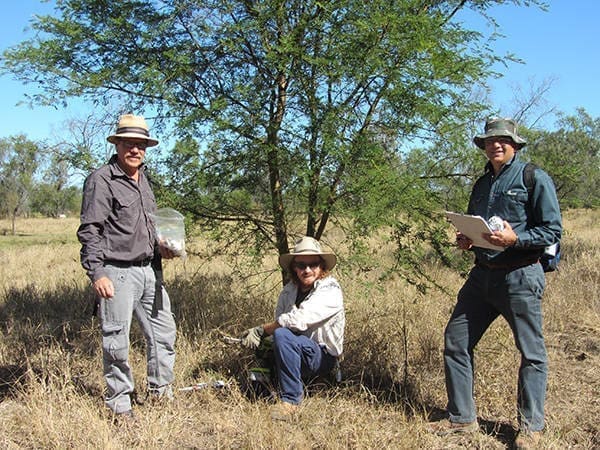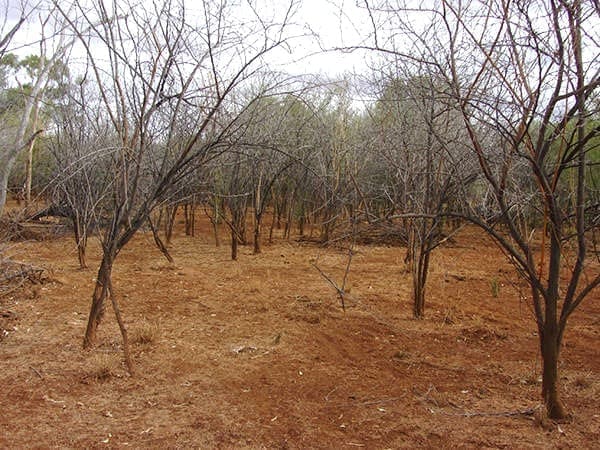
Professor Vic Galea, Paul Humphreys (Ecosure) and Peter Riikonen at a parkinsonia control trial site near Rockhampton in Central Queensland.
A NATURAL control agent that will help manage one of Australia’s most invasive introduced woody weeds has become the first woody weed bioherbicide to be granted federal regulatory approval.
The Di Bak Parkinsonia fungal bioherbicide was developed at the University of Queensland by plant pathologist Professor Victor Galea and Dr Naomi Diplock.
BioHerbicides Australia (BHA) was formed by UQ’s UniQuest commercialisation company in 2010, when it sought Australian Pesticides and Veterinary Medicines Authority approval to market the bioherbicide.
Following an eight-year wait, the Di Bak fungal bioherbicide received regulatory approval last month, paving the way for the product to be safely used nation-wide.
Parkinsonia is one of Australia’s most invasive weeds, threatening rangelands, wetlands and natural waterways, as well as native plants and animal species.
“This weed is so problematic that in many parts of the country, the law requires landholders to contain Parkinsonia bushes on their properties,” BHA managing director Peter Riikonen said.
Current attempts to control the introduced species involved invasive mechanical clearing of land or potentially harmful chemical sprays, which was why the fungal bioherbicide had so much potential, Mr Riikonen said.
The control agent can be injected into the trunk of the Parkinsonia tree, causing it to die without damaging the surrounding environment.
A large study involving 90 trial sites across northern Australia was conducted and supported by Meat & Livestock Australia.
Professor Galea said he co-developed the bioherbicide using naturally occurring fungi that causes plants to die back.
“It was developed as a result of research conducted with Dr Diplock to explore the cause of dieback of Parkinsonia that occurs naturally in our landscape, with a view to harnessing it to create a natural management method,” he said.
“The result has been a new and effective biological agent that is safe to use, causes minimal harm to the environment and will result in sustainable and ethical control.
“This bioherbicide, which can be made into capsules and injected into trees, will change the way we manage woody weeds in our landscape,” he said.

Parkinsonia treated with the Di-Bak fungal bioherbicide at a trial site near Dajarra in northwest Queensland.
Source: University of Queensland

This is a positive step forward in Woody weed control and highlights the depth of patient research and investment to achieve such an outcome – congratulations to all involved
If it is natural, why is the APVMA involved to begin with? I recall some people found a natural fungus that attacks weedy sporobolus grasses and started marketing it. The APVMA shut them down even though what they were selling was a native fungus already widespread. https://parra-trooper.com.au/